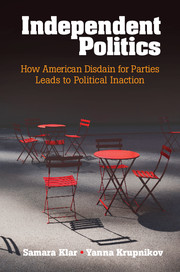Book contents
- Frontmatter
- Contents
- List of Figures
- List of Tables
- Acknowledgments
- 1 Independents in Name Only
- 2 Inside the Mind of an Independent Voter in America
- 3 How Do You Like Me Now? The Desirability of Political Independence
- 4 Everybody Hates Partisans
- 5 Partisanship and Political Participation
- 6 Undercover Partisans in America
- 7 The Myth of Partisan Compromise
- 8 The Partisan Underground in an Era of Polarization
- Appendix
- References
- Index
6 - Undercover Partisans in America
Published online by Cambridge University Press: 05 January 2016
- Frontmatter
- Contents
- List of Figures
- List of Tables
- Acknowledgments
- 1 Independents in Name Only
- 2 Inside the Mind of an Independent Voter in America
- 3 How Do You Like Me Now? The Desirability of Political Independence
- 4 Everybody Hates Partisans
- 5 Partisanship and Political Participation
- 6 Undercover Partisans in America
- 7 The Myth of Partisan Compromise
- 8 The Partisan Underground in an Era of Polarization
- Appendix
- References
- Index
Summary
“I don't really label myself as Republican or Democrat.”
– Barbara P. Bush, daughter of President George W. BushWe may not have a true monarchy, but since 1900 three families have been often thought of as American multigenerational political royalty: the Roosevelts, the Kennedys, and the Bushes. The Roosevelt family famously has both a Republican branch and a Democratic branch. The Kennedy family and the Bush family, on the other hand, are “single party” families: Kennedys are Democrats, and Bushes are Republicans.
Yet when People magazine asked the youngest generation of the Bush family – twin sisters Barbara Bush and Jenna Bush Hager – about their political affiliation, their answer proved unexpected. “I don't really label myself as Republican or Democrat,” said Barbara. Jenna agreed, “We're both very independent thinkers.” Barbara and Jenna are the daughters of Republican President George W. Bush, granddaughters of Republican President George H. W. Bush, great granddaughters of Republican Senator Prescott Bush. The Republican Party, some might argue, is in their blood. Yet, when asked about it publicly, even the Bush twins shy away from partisanship, preferring to convey an independent image.
Throughout this book, we have argued that this reluctance is not necessarily due to sincere political ambivalence. Are the Bush twins truly undecided? Do they really have no preference for the party that their great-grandfather represented as senator, their grandfather represented as president, their father represented as president, and their uncle represented as governor? Perhaps. But it is also possible that the Bush twins use the term “independent” to carefully manage the impressions others form of them. Like many other Americans, they might believe that refusing to identify with a party helps them to promote a positive image.
Across a variety of studies, we show that as people try to make positive impressions, they become more likely to move away from parties. The label independent is just one indicator of eschewing partisanship; shifting away from parties may also take the form of avoiding political actions that could betray one's partisan preferences. In this chapter we address one remaining question that is often leveled against experimental research: can we observe this pattern outside of the “laboratory”?
EXPERIMENTAL POLITICS
The studies we present in the previous three chapters of this book are part of a growing movement in the study of politics: the use of experiments.
- Type
- Chapter
- Information
- Independent PoliticsHow American Disdain for Parties Leads to Political Inaction, pp. 107 - 126Publisher: Cambridge University PressPrint publication year: 2016

